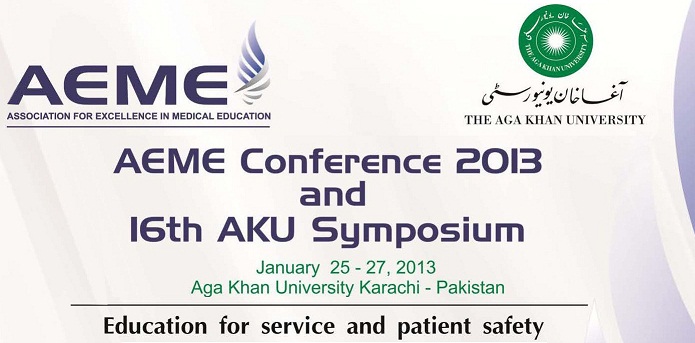Day 1 : Oral Presentations (Theme: Curriculum - Teaching & Learning)
Study guides: perception of students about study guides in an undergraduate medical college
Location
AKU Auditorium
Start Date
26-1-2013 3:30 PM
Abstract
Background: Self-directed learning is becoming increasingly important in medical education due to information overload that requires medical students to develop self-directing skills. Study guide is an aid mostly in the form of printed notes designed to assist students with their learning. The objective of the study was to explore the perception of students about the use of study guide as a learning tool
Methods: A cross-sectional, descriptive study was done. A 28 item Likert scale questionnaire was distributed among second, third and fourth year MBBS students of BUMDC. Ethical approval was sought. Questionnaires were coded as B for second year, C for third year and D for fourth year MBBS. The responses ranged from 1 to 5 indicating 1= strongly disagree and 5= strongly agree. Data was analyzed in SPSS version 16.ANOVA was used for looking at differences in perceptions of the three groups of students and for individual differences Tukey’s test was applied.
Results: Respondents were one hundred forty seven females and one hundred and ten males. Majority of the students agreed that the layout and content of study guide helped in self directed learning, with significant difference in different batches of medical school second year to fourth year (p<0.05). The mean ± sd scores of perception about assessment and identifying resources also showed significant difference in different batches of medical school (p<0.05).
Conclusion: The perception about the use of study guide as a learning tool was appreciated by students. There was significant difference in perception which may signify that older batches were familiar with the use of study guides. Their content and presentation will be reviewed and improved based on the results of this study and feedback from students. Future research may include other colleges who are using study guide and compare their findings with ours as well as effectiveness of study guide on student performance can also be compared.
Study guides: perception of students about study guides in an undergraduate medical college
AKU Auditorium
Background: Self-directed learning is becoming increasingly important in medical education due to information overload that requires medical students to develop self-directing skills. Study guide is an aid mostly in the form of printed notes designed to assist students with their learning. The objective of the study was to explore the perception of students about the use of study guide as a learning tool
Methods: A cross-sectional, descriptive study was done. A 28 item Likert scale questionnaire was distributed among second, third and fourth year MBBS students of BUMDC. Ethical approval was sought. Questionnaires were coded as B for second year, C for third year and D for fourth year MBBS. The responses ranged from 1 to 5 indicating 1= strongly disagree and 5= strongly agree. Data was analyzed in SPSS version 16.ANOVA was used for looking at differences in perceptions of the three groups of students and for individual differences Tukey’s test was applied.
Results: Respondents were one hundred forty seven females and one hundred and ten males. Majority of the students agreed that the layout and content of study guide helped in self directed learning, with significant difference in different batches of medical school second year to fourth year (p<0.05). The mean ± sd scores of perception about assessment and identifying resources also showed significant difference in different batches of medical school (p<0.05).
Conclusion: The perception about the use of study guide as a learning tool was appreciated by students. There was significant difference in perception which may signify that older batches were familiar with the use of study guides. Their content and presentation will be reviewed and improved based on the results of this study and feedback from students. Future research may include other colleges who are using study guide and compare their findings with ours as well as effectiveness of study guide on student performance can also be compared.

